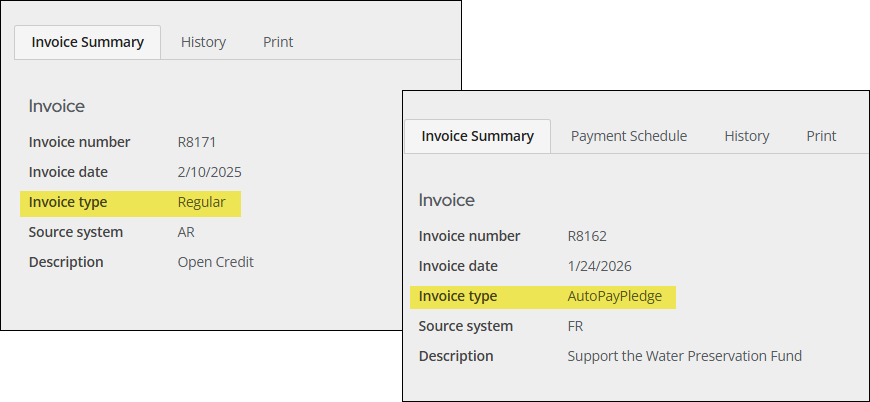Last updated on: January 27, 2026
An Invoice type is a classification of the various types of invoices in iMIS.

Review the following to understand the different types:
- Regular – An invoice created from product orders and event registrations, and for charitable donations.
- Gift – An invoice created as part of a charitable donation transaction
- Pledge – An invoice created as part of a charitable donation that is to be paid later.
- AutoPayPledge – An invoice created by the Process recurring donations procedure.
- MembershipJoin – An invoice created when initially purchasing a membership join.
- MembershipRenewal – An invoice created by the Generate renewals procedure.
- AutoPayBilling – An invoice created when initially joining a membership group using an ACH payment method where the member enrolled in automatic renewals. The payment is delayed to allow the generation of an AutoPayAccount and the invoice which must be submitted to Pay Central to be processed.
- AutoPayRenewalBilling – An invoice created by the Generate renewals procedure when the member is enrolled in automatic renewals.
- AutoPaySubscriptionFees - Not available for selection through the Open Invoice List Display content item but appears by default any time SubscriptionFees is configured to be shown. This invoice type is similar to AutoPayRenewalBilling, except it is generated by a non-membership billing cycle.
- InstallmentPledge – An invoice created as part of a charitable donation that is to be paid in multiple installments over a specified term.
- SubscriptionFees – An invoice created by the Generate renewals procedure for a non-membership billing cycle.
- AdditionalMembershipFees - (With Persisted cash membership invoices disabled) Displays invoices created through the following scenarios:
- A staff user updates a member’s customer type while the member has an open cash-based membership invoice. The open invoice is converted to the AdditionalMembershipFees type and remains available for payment on the member’s account page.
- A member has an outstanding balance for some membership fees. They are billed for the next term, but those fees are not included in the renewal (e.g., the items were removed from the billing cycle). The older membership fees are now available to be paid or reversed in an invoice with an AdditionalMembershipFees type.
- A member adds optional items during renewal, but the payment must be reversed or refunded. The optional items are then available to pay or be reversed separately from the renewal invoice, in an invoice with an AdditionalMembershipFees type.
- RenewalAdjustment - (With Persisted cash membership invoices enabled) An invoice created when a member adds optional items during renewal.
Note: In general, a Gift invoice should not have open balances.
Note: Any mid-term changes made to a membership will adjust the previous invoice instead of creating a new invoice.
Note: When an AdditionalMembershipFee invoice is paid in full or reversed, it no longer appears in iMIS.